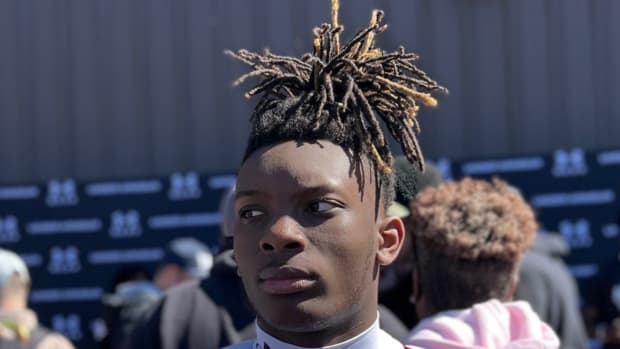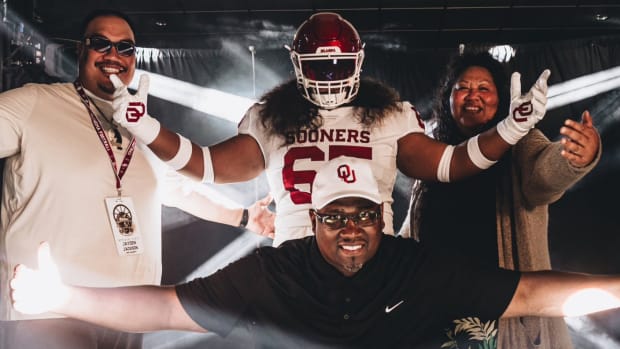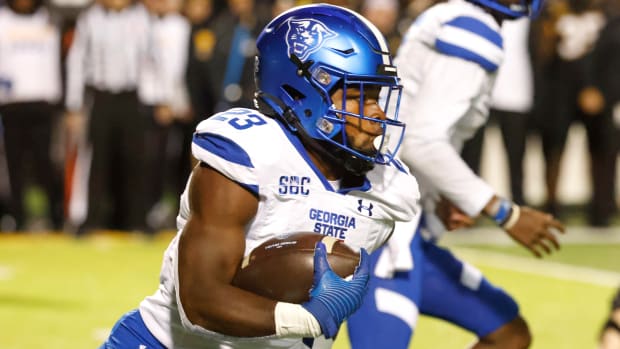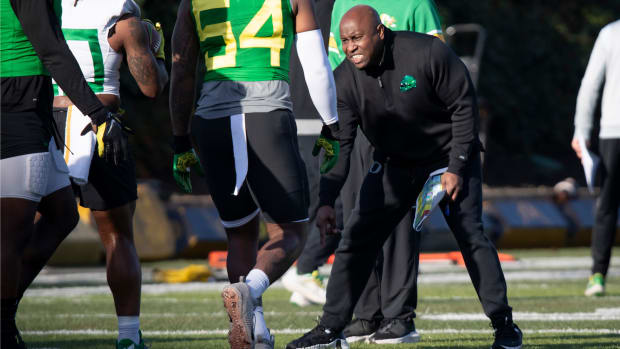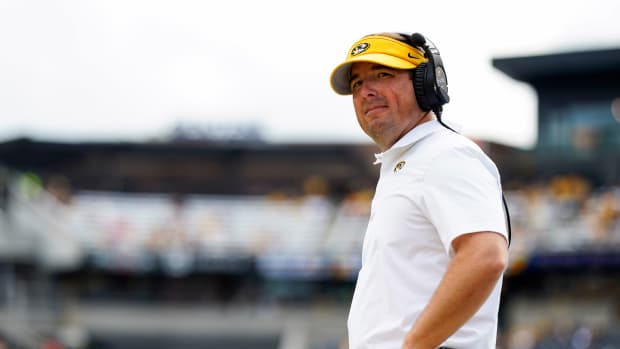Will Hugh Freeze have to testify in Laremy Tunsil lawsuit?
Get all of Michael McCann's columns as soon as they’re published. Download the new Sports Illustrated app (iOSorAndroid) and personalize your experience by following your favorite teams and SI writers.
Should Ole Miss head football coach Hugh Freeze have to testify in a lawsuit filed by Laremy Tunsil’s stepfather, Lindsey Miller, against the former Ole Miss star offensive tackle? And if Freeze must testify, should the testimony be shielded from public view?
Freeze’s prospective testimony, which would center on what Freeze knew about an altercation between Tunsil and Miller in June 2015, could prove of substantial interest to Ole Miss fans and to the NCAA. Since leaving Ole Miss, Tunsil has admitted that he took money from Ole Miss staffers, an admission that—if verified—would indicate that Ole Miss coaches violated NCAA amateurism rules. If Freeze testified that Tunsil received money from staffers or from would-be agents, such a disclosure would come at a particularly inopportune time for the football program. In January, the NCAA charged Ole Miss with 28 NCAA violations, 13 of which were connected to the football program. Ole Miss has until May 21 to respond to the NCAA’s Notice of Allegations. If Ole Miss is found to have violated NCAA rules, it could face a range of sanctions, including probation, scholarship reductions and postseason bans. Should it become publicly accessible, Freeze’s testimony would be admissible in the NCAA’s review of Ole Miss.
From Miller’s perspective, the potential impact of Freeze’s testimony on the Ole Miss football program is irrelevant for purposes of the law. Miller, a disabled Navy combat veteran, contends that the 6’5, 305-pound Tunsil pushed him to the floor in their home in Lafayette County, Miss. Miller also asserts that Tunsil punched him several times, including in the face. According to Miller, Tunsil’s attack related to Miller expressing concerns to Desiree Polingo—Miller’s wife and Tunsil’s mother—about Tunsil possibly receiving gifts and other impermissible benefits from would-be agents. Miller contends that he warned Polingo that such benefits are in direct contravention of NCAA amateurism rules and would endanger Tunsil’s NCAA eligibility.
Tunsil’s account of the incident is radically different. Tunsil reportedly told others—possibly including Freeze—that he was merely defending his mother from Miller’s attack and that his stepfather was the aggressor. Both Miller and Tunsil would be arrested for the incident, although criminal charges against the two were dropped.
The lawsuit
In a civil lawsuit recently filed in the Circuit Court of Lafayette County and to be presided over by Circuit Court Judge John Kelly Luther, Miller insists that Tunsil owes him monetary damages for violations of three counts—assault and battery, intentional infliction of emotional distress and defamation of character. The assault and battery claim addresses the alleged physical confrontation, while the intentional infliction of emotional distress claim is premised on Miller’s contention that Tunsil’s behavior was so outrageous and atrocious that it must have been designed to “shock the conscience” and provoke outrage.
The final claim in Miller’s lawsuit—defamation of character—is the claim of interest to Freeze. Miller maintains that Tunsil slandered Tunsil’s name by allegedly lying to Freeze and other members of the Ole Miss football coaching staff about Miller beating up Polingo. This theory posits that Tunsil knew journalists would publish remarks by Ole Miss coaches about the incident and those remarks would depict Miller as a wife beater. In a legal filing prepared by attorney Matthew Wilson, Miller highlights that ESPN.com published a story that incorporates quotes from sources depicting Miller as abusive. For instance, the story quotes an anonymous source as saying, “His stepfather shoved his mom and Laremy punched him. It’s as simple as that. He was defending his mother.” The story also includes a statement by Freeze in which the coach states, “The incident . . . involves Laremy defending his mother against his stepfather” and “ . . . I am proud of him for standing up for his mother and protecting his family.”
Miller does not necessarily blame Freeze for his public portrayal of the altercation since Freeze was only relaying what had been to him. Nevertheless, Miller wants Freeze to explain, under oath, why Freeze told ESPN this particular account. Miller further reasons that Freeze’s testimony is essential to proving the defamation claim. Miller is a “vortex public figure”—a distinction for someone who becomes a public figure in a limited setting (here, Miller is a public figure for purposes of his altercation with a college football superstar). Significantly, a public figure suing for defamation in Mississippi must show that the defendant acted with malice—namely, with intent or recklessness. Miller wants Freeze to explain who told him about the altercation and any other pertinent details that may have been conveyed. Miller also knows that ESPN will not voluntarily reveal the anonymous source for its story. Further, ESPN has no legal obligation to reveal the source given the First Amendment’s protection for news reporting. This means, Miller posits, that only Freeze can reveal how he learned of the incident.
• MCCANN: Analyzing implications of release of Joe Mixon video
For his part, Freeze maintains that Miller has no legal right to depose him. In a request for a protective order that would deny or substantially limit any deposition, Freeze’s attorneys, J. Cal Mayo Jr. and Kate Embry, write that Miller has no idea if Freeze even spoke with Tunsil about the incident:
For all [Miller] knows, Freeze could have spoken to Ms. Polingo or members of his coaching staff. Perhaps he reviewed the charges filed against Plaintiff by Defendant and Ms. Polingo. Freeze could have obtained information about the domestic dispute . . . from a variety of sources.
Further, Freeze’s attorneys assert, Freeze’s statement to the media never indicated that Miller struck Polingo. The statement instead contained the more general assertion that Tunsil stood up for Polingo and defended his family—assertions that do not directly implicate Miller. As a consequence, the attorneys contend, Freeze is not a relevant person in determining whether or not Tunsil committed defamation in his portrayal of Miller.
Most likely, Freeze will have to testify and chances are the testimony would be publicly accessible
Unfortunately for Freeze, it is rare for a court to issue a protective order that prevents the taking of a witness deposition. Under Mississippi law, the witness must establish one of several narrowly defined rationales to gain a protective order. One such rationale is that the taking of a deposition would cause the witness, “annoyance, embarrassment, oppression or undue burden or expense.” This rationale could be relevant to Freeze, especially if he were to reveal information that might in some way compromise the Ole Miss football program in its relationship with the NCAA. Freeze’s legal filing, however, does not suggest he would suffer from these types of harm. Chances are Freeze will have to testify.
Freeze might enjoy more success arguing that questions posed during deposition be limited to the altercation between Tunsil and Miller. If Freeze is only posed questions about how he learned of the Tunsil-Miller altercation, those questions would not necessarily extend into a discussion of whether Tunsil accepted benefits in contravention of NCAA rules. On the other hand, if Freeze is asked about the underlying topic of Tunsil’s compliance with NCAA rules while at Ole Miss, the deposition might—depending on what Freeze would say—become problematic for the coach.
As to whether any deposition by Freeze would be sealed from the public’s view, chances are it would not be sealed. Courts generally do not seal information from the public and only do so in exceptional circumstances. It is not apparent how Freeze could insist that such circumstances exist for him. He is an employee of a public university and, with an annual salary of $4.7 million, is the highest paid public official in the state of Mississippi. His testimony about a student-athlete matter would seem of interest to the state and its taxpayers, who subsidize their state universities. Freeze potentially arguing that his testimony might hurt the Ole Miss football program would not constitute a persuasive legal argument.
• STAPLES: Football success not enough to save Baylor
The “x” factor in whether Freeze must testify is the defendant, Tunsil, whom the Miami Dolphins drafted #13 in the 2016 NFL Draft. At any point, Tunsil could reach a settlement with Miller where he pays Miller some amount of money. In exchange, Miller’s case would be dismissed and Freeze would not need to testify. Tunsil might find a settlement attractive, especially if he worries that Miller’s lawsuit could become a distraction for him in his rookie NFL season. Plus, Tunsil already has other controversies with which to contend. Most notably, Tunsil’s social media accounts were hacked during the draft and a video of Tunsil apparently smoking marijuana while wearing a gas mask was posted. As I wrote on SI.com, the draft night debacle likely violated the law. It caused Tunsil to fall in the draft and lose millions of dollars. Should Tunsil determine the identity of the hacker or hackers, he could file a lawsuit and seek damages.
Assuming that Miller and Tunsil fail to reach a settlement in the near future, it will likely take weeks before there is resolution on whether Freeze must testify. SI.com will keep you updated on any developments.
Michael McCann is a legal analyst and writer for Sports Illustrated. He is also a Massachusetts attorney and the founding director of the Sports and Entertainment Law Institute at the University of New Hampshire School of Law. He also created and teaches the Deflategate undergraduate course at UNH, serves as the distinguished visiting Hall of Fame Professor of Law at Mississippi College School of Law and is on the faculty of the Oregon Law Summer Sports Institute.

